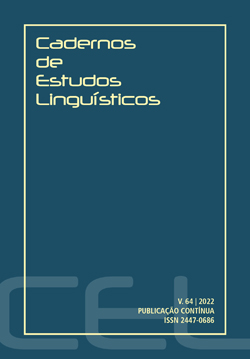Abstract
This work is part of a broader study on the acquisition of Brazilian Portuguese (PB) as second language (L2) in a school setting, along the Brazil’s northern border (Pacaraima) and Venezuela's southern border (Santa Elena de Uairén). We analyzed the speech of three Venezuelan four-year-old children acquiring BP, in particular the issue of code-switching, by three 4-year-old Venezuelan children interacting with native speakers of BP in the classroom (Early Childhood Education). Eighteen sessions, between 30 and 45 minutes, were filmed in the classroom and later transcribed using the CHAT/CLAN tool. This is a longitudinal and qualitative study. To analyse the data, we used a dialogic and discursive approach that seeks to understand how language and the production of meaning work. Both occur in the relationships undertaken among subjects, in relation to other discourses, in which sociocultural and ideological aspects are involved, in certain discursive contexts (BAKHTIN; VOLOCHÍNOV, 2014 [1929], SALAZAR-ORVIG, 2010; SALAZAR-ORVIG et. al., 2010, Del Ré et al, 2014a). The findings of this research (reveal that children code-switch in a variety of ways during certain discursive events at school, especially when motivated by external factors such as the topic of interaction or prior experience with distinct speech genres as children’s songs and tales.
References
BAKER, C.; WRIGHT, W. E. Foundations of bilingual education and bilingualism. 6th ed. Bristol, UK: Multilingual Matters, 2017.
BAKHTIN, M.; VOLOCHÍNOV, V. N. Marxismo e filosofia da linguagem. 16. ed. São Paulo: Hucitec Editora, 2014 [1929].
BAKHTIN, M. Os gêneros do discurso. Tradução: Paulo Bezerra. São Paulo: Editora 34, 2016 [1979].
BAKHTIN, M. Estética da criação verbal. 6. ed. São Paulo: Martins Fontes, 2011 [1979].
BARROS, D. L. P. de. Dialogismo, polifonia e enunciação. In: BARROS, D. L. P.; FIORIN, J. L. (Orgs.) Dialogismo, polifonia e intertextualidade: em torno de Mikhail Bakhtin. São Paulo: Edusp, 1994. p. 1-9.
BRAIT, B (Org.). Bakhtin: conceitos-chave. 5. ed. São Paulo: Contexto, 2014.
BRAIT, B.; MELO, R. de. Enunciado/enunciado concreto/anunciação. In: BRAIT, B (Org.). Bakhtin: conceitos-chave. 5. ed. São Paulo: Contexto, 2014. p. 61-78.
BLOOMFIELD, L. Language. (With a new foreword by C. F. Hockett) University of Chicago Press: Chicago and London, 1984 [1933].
BRUNER, J. Como as crianças aprendem a falar. Porto Alegre: Instituto Piaget, 1983.
BULLIO, P. C. Referência e code-switching: traços de singularidade na linguagem de uma criança bilíngue, 2014, 655f. Tese (Doutorado) - Universidade Estadual Paulista Júlio de Mesquita Filho, Faculdade de Ciencias e Letras (Campus de Araraquara), 2014.
BUTLER, Y. G.; HAKUTA, K. Bilingualism and second language acquisition. In: BHATIA, T. K.; RITCHIE, W. C. (Eds.). The Handbook of Bilingualism. United Kingdom: Blackwell Publishing, 2004. p. 114-144.
DEL RÉ, A. Pluralismo teórico-metodológico em Aquisição da Linguagem: o lugar do sujeito e da linguagem nas pesquisas In: O Fazer Científico.1a ed. Campinas: Mercado de Letras, 2014, v.2, p. 341-372.
DEL RÉ, A.; HILÁRIO, R. N.; VIEIRA, A. J. Subjetividade, individualidade e singularidade na criança: um sujeito que se constitui socialmente. Bakhtiniana: Revista de Estudos do Discurso, v.7, p.57 – 74, 2012.
FARACO, C. A. Linguagem & diálogo: as ideias linguísticas do círculo de Bakhtin. São Paulo: Parábola Editorial, 2009.
FIORIN, J. L. Introdução ao pensamento de Bakhtin. 2. ed. São Paulo: Ática, 2016.
FRANÇOIS, F. O que nos indica a “linguagem da criança”: algumas considerações sobre a “linguagem”. In: DEL RÉ, A. (Org.) Aquisição da linguagem: uma abordagem psicolinguística. São Paulo: Contexto, 2006. p.183-200.
GASS, S. M. e SELINKER, L. Second language acquisition: an introductory course. Third edition. Routledge Taylor & Francis: London, 2008.
GROSJEAN, F. Individual bilingualism. In: SPOLSKY, B. (editor). Concise Encyclopedia of Educational Linguistics. Oxford: Elsevier, 1999. p. 284-290.
GROSJEAN, F. The bilingual’s language modes. In: WEI, L. (editor) The bilingualism reader. 2nd ed. London: Routledge, 2006. p. 248-451.
HILÁRIO, R. N. Um olhar sobre a aquisição do plural em crianças São Paulo: Cultura Acadêmica, 2015.
KRASHEN, S. D. Principles and practice in second language acquisition. Oxford: Pergamon Press Inc., 1982.
KRASHEN, S. D. Explorations in language acquisition and use. Portsmouth: Heinemann, 2003.
LYONS, John. Língua(gem) e linguística. Editora LTC. Rio de Janeiro: 1987.
MYERS-SCOTTON, C. Multiple voices: an introduction to bilingualism. Malden, EUA: Blackwell Publishing, 2006.
POPLACK, S. Sometimes I’ll start a sentence in Spanish y termino en español: toward a typology of code-switching. In: WEI, L. (editor) The bilingualism reader. London: Routledge, 2006. p. 213-243.
SALAZAR-ORVIG, A. Dialogical factors in toddlers’ use of clitic pronouns. First Language n.30 (3-4), p. 375-402, 2010.
SALAZAR-ORVIG, A. et al. Dialogical beginnings of anaphora: The use of third person pronouns before the age of 3. Journal of Pragmatics n. 42, p. 1842-1865, 2010.
SAVILLE-TROIKE, Muriel. Introducing Second Language Acquisition. Cambridge University Press New York, 2006.
SOBRAL, A. Do dialogismo ao gênero: as bases do pensamento do Círculo de Bakhtin. Campinas: Mercado de Letras, 2009.
SOUZA, R. A. Segunda língua: aquisição e conhecimento. (Linguística para o ensino superior, 10). São Paulo: Parábola Editorial, 2021.
SPOLSKY, B. Sociolinguistics. Oxford: Oxford University Press, 1998.
WEI, L. Dimension of bilingualism. In: WEI, L. (editor) The bilingualism reader. London: Routledge, 2006. p. 3-22.
WEINREICH, U. Lenguas en contacto: descubrimientos y problemas. Traducción: Francisco Rivera. The Hague: Mouton. Ediciones de la biblioteca Universidad Central de Venezuela, 1974.

This work is licensed under a Creative Commons Attribution-NonCommercial 4.0 International License.
Copyright (c) 2022 Cadernos de Estudos Linguísticos


